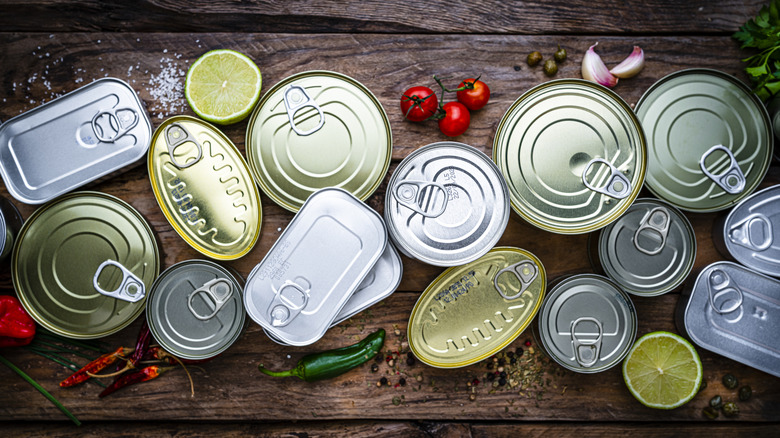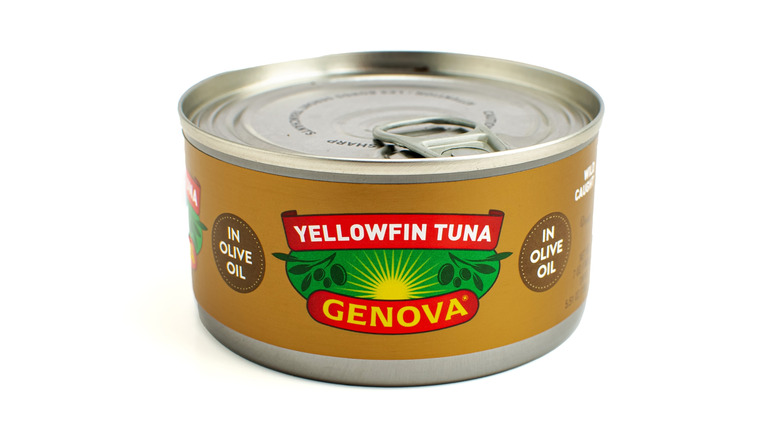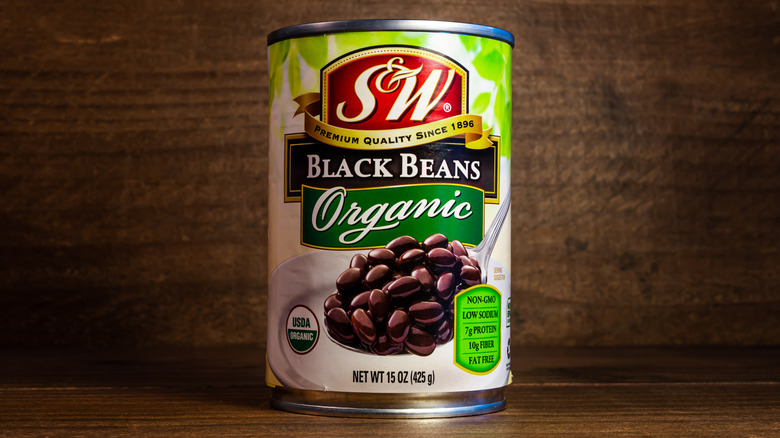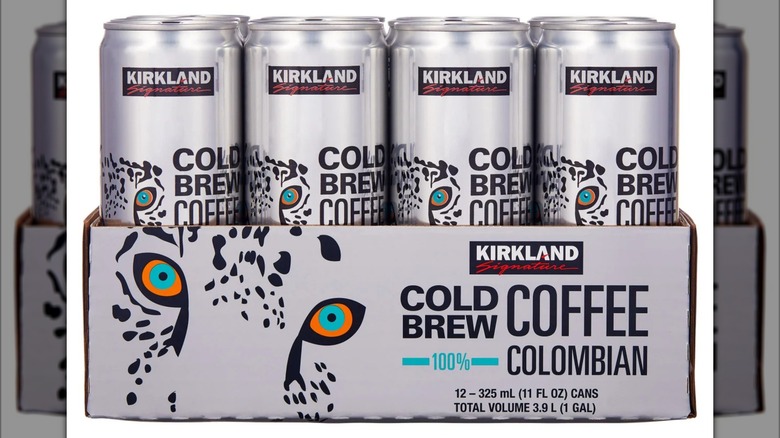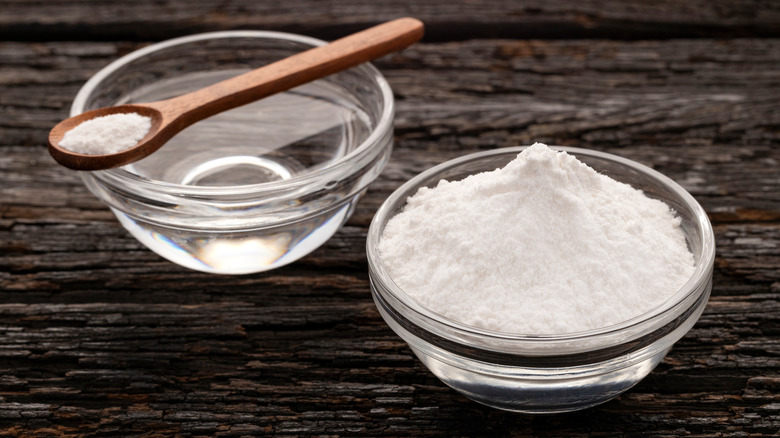4 Canned Food And Drink Recalls That Plagued Costco
Costco's biggest food recalls have involved everything from frozen produce to shelled nuts. While some of the big-box retailer's recalls were completely voluntary and enacted out of precaution, others occurred as a result of more serious issues. As a large wholesale retailer with an abundance of food and drink products, Costco is bound to recall items on occasion. In order to keep consumer trust high, it's important to keep recalls transparent and act quickly. Fortunately, Costco has a history of acting diligently.
This vigilant conduct is crucial when handling canned goods. Despite generally being an extremely safe, long-lasting food, tinned goods may harbor harmful bacteria like Clostridium botulinum, which can cause botulism, a rare but potentially fatal illness. Bloated, dented, or leaky cans are clear signs of a can that may contain dangerous bacteria.
Though it's wise to stay independently informed of potential mishaps, Costco monitors recall notices from its suppliers and the FDA. Once a recall is confirmed, Costco contacts members directly, typically via text messages. From beans to coffee, here are Costco's most notable canned food and drink recalls.
Genova tuna
Though Costco's canned tuna is a great lunchtime staple, meal time was cut short in February 2025 when Tri-Union Seafoods initiated a voluntary recall of various canned tuna products under its Genova brand. The issue concerned the company's "easy open" canned goods, which allow consumers to pull cans open without a traditional can opener. The defect first came to light when one of Genova's suppliers noted a manufacturing error that compromised the can's integrity, thus increasing the risk of leaks, spoilage, or more seriously, Clostridium botulinum.
The recall included 5- and 7-ounce cans, with "Best if Used By" dates ranging from December 2027 to January 2028. The 7-ounce cans, sold in packs of six, specifically affected Costco stock. These cans bore the universal product code 4800063267 and expiry dates of January 21, 23, and 27 of 2028.
Customers were advised to dispose of the product or return the cans to the point of purchase for a full refund. The recall was geographically limited but affected Costco warehouses in Florida, Georgia, Tennessee, North Carolina, and Puerto Rico. Genova reported on its website that the recall was done "out of an abundance of caution," and though no illnesses were reported post-recall, the incident did make our list of the the biggest tuna recalls in U.S. history.
O Organics and S&W organic black and chili beans
In April 2021, Faribault Foods Inc. initiated a voluntary recall of its 15-ounce cans of O Organics organic black beans, O Organics organic chili beans, and S&W organic black beans, the latter of which was available in 8-packs at Costco warehouses nationwide. The company believed the cans' metal seals might have been jeopardized, running the risk of Clostridium botulinum contamination. The affected cans were distributed between February and April 2021. The bean manufacturer also shared the cans' lot numbers, as well as their expiration dates, which ranged from January 31 to February 4, 2023. They advised consumers to return the cans to the point of purchase in order to receive a refund or replacement and to avoid potential illness.
Less than a month later, Faribault Foods Inc. significantly expanded its recall of its S&W organic black beans cans, citing distribution dates ranging from August 2020 to April 2021, with "best by" dates extending as far back as July 2022. The recalled beans were distributed to Costco warehouses across 11 states — Arizona, Arkansas, California, Colorado, Georgia, Hawaii, Idaho, Oregon, Texas, Utah, and Washington — making it one of the biggest canned vegetable recalls in history.
Users on Reddit shared that Costco notified them about the incident, though the recall left some shoppers feeling wary. One user commented, "All kinds of recalls coming from Costco lately. What ... is going on?" Another user countered, "Lots of recalls everywhere all the time. Costco just notifies members of the issues."
Kirkland Signature Colombian cold brew coffee
In March 2023, Costco supplier Berner Foods Inc., otherwise known as Berner Food & Beverage, initiated a significant recall of its Kirkland Signature Colombian Cold Brew Coffee due to the potential presence of metal fragments. The sizable recall affected approximately 231,071 cases, adding up to a whopping 2.77 million cans and resulting in one of the biggest coffee recalls in history. These cans were distributed across 13 states: Arizona, California, Colorado, Florida, Georgia, Illinois, Maryland, Michigan, Minnesota, New Jersey, Texas, Utah, and Washington. The affected cases had "best by" dates ranging from October 19 to 27, 2023. The FDA categorized the recall as Class II, indicating potential health risks to consumers.
Costco recommended shoppers return the canned coffee to their local warehouse for a full refund. The cold brew cans were sold under the Kirkland Signature label exclusively at Costco, making the recall especially impactful to the warehouse chain. Though Costco promptly removed the cans from shelves, as of May 2025, the cans are still available from the warehouse chain.
Users on Reddit wondered about the size of the metal pieces and whether or not it was possible to ingest a small amount of metal without noticing. In a letter to affected consumers, Berner Food & Beverage assured Costco shoppers that the likelihood of receiving an impacted can was extremely low. The statement went on to explain, "Due to the bolt size, you would have heard the bolt inside the can. The likelihood of the bolt falling out of the opening of the can while drinking is slim (requires shaking to get the bolt out) and you would have felt it in your mouth."
Thrive Life and Nutristore baking powder
In May 2020, Costco issued a recall for Thrive Life baking powder and Nutristore baking powder due to instability within the cans. In separate letters to customers, Nutristore and Thrive Life shared, "It has come to our attention that over time a reaction may take place in our baking powder product which may cause cans to expand or bulge and increase the risk of sudden release of the powder when the can is opened and could pose the risk of injury." Both letters went on to describe a few instances in which added pressure caused a can's lid to suddenly release, triggering the voluntary recall.
The recall affected 96-ounce containers of the baking powder cans, which were discontinued in August 2015. Though the letters emphasized that there was no consumption risk with the product, the companies strongly recommended throwing the cans away, preferably in an outdoor trash can with a lid in order to proceed with utmost caution.
The recall only affected unopened containers, as open cans were no longer pressurized. Though most cans had already passed their five-year expiration date, Costco promised $10 gift cards regardless of expiry period, as long as shoppers properly disposed of their unopened cans.
